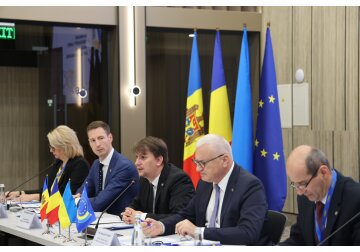
The European Union's Solidarity Lanes initiative is a key catalyst for Moldova’s and Ukraine's integration into the EU and expansion of their trade – the Customs Service
Director of the Customs Service, Alexandru Iacub, stated this while speaking at the 3rd International Forum on Trade Facilitation, where the EU’s Solidarity Lanes initiative was discussed as the most important element of Ukraine’s and Moldova's integration into the European Union. The Forum, held in Chisinau, was jointly organized by the European Union Border Assistance Mission to Moldova and Ukraine (EUBAM) and the Moldovan Customs Service. The Forum brought together high-level representatives to assess the impact of the Solidarity Lanes on regional connectivity, trade facilitation and wider integration of the two countries into the EU. Originally conceived as an emergency measure following the blockade of Ukrainian ports, Solidarity Lanes have evolved into a strategic framework aimed at improving ties with the EU and promoting regional cooperation, it was noted. Forum participants highlighted Ukraine's resilience in creating alternative sea routes and emphasized the vital role of Solidarity Lanes in supporting the global food supply chain and stabilizing the Ukrainian economy in the context of war. The Forum discussed the initiative's contribution to modernizing customs and border management, bringing procedures in line with EU standards, and integrating Moldova and Ukraine into the Trans-European Transport Network (TEN-T). The sides also emphasized the need for the EU's financial support and infrastructure development to ensure the sustainability of these efforts. Alexandru Iacub said that Moldova appreciates the continued support of the EU and the EUBAM mission, which provides technical and operational assistance to overcome border problems and regional crises. “This Forum, now in its third edition, has become an important platform for dialogue, bringing together key players to identify effective solutions that facilitate trade flows, optimize cross-border transport and improve infrastructure capacity. The Moldovan Customs Service reaffirms its commitment to support the Solidarity Lanes initiative and to continue active regional cooperation to facilitate international trade and increase the connectivity of Moldova and Ukraine to the trans-European transport networks,” said Alexandru Iacub. EUBAM head Slawomir Pichor said that from day one, the EU's Cross-Border Assistance Mission was aimed at supporting Solidarity Corridors, especially in the Lower Danube region, to facilitate trade and increase the capacity of this vital corridor. “Our goal was to make these routes faster and more efficient, and we have seen progress through coordinated controls and joint operations. Today, Solidarity Lanes are no longer just an anti-crisis measure. They are part of a transformation process that supports the integration of both countries into the EU and the development of multimodal transport corridors. We must ensure that they remain a credible alternative for Ukraine's access to world markets and protect their role in promoting stability and economic recovery,” he said. Forum participants reaffirmed their commitment to developing border and transport infrastructure, supporting digitalization efforts and building a sustainable framework to maintain ties with the EU while addressing regional challenges caused by Russia's continued aggression. // 11.10.2024 - InfoMarket.







